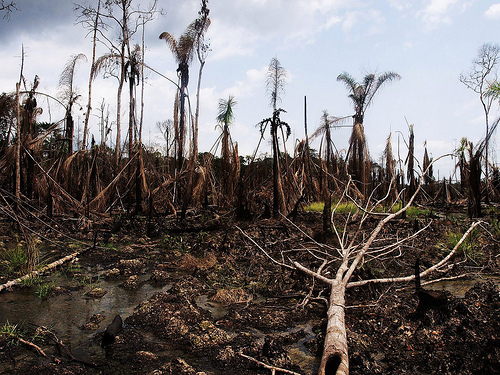Is Papua New Guinea the New Niger Delta?
 The New York Times reports:
The New York Times reports:
In 2014, ExxonMobil is scheduled to start shipping natural gas through a 450-mile pipeline, then on to Japan, China and other markets in East Asia. But the flood of revenue, which is expected to bring Papua New Guinea $30 billion over three decades and to more than double its gross domestic product, will force a country already beset by state corruption and bedeviled by a complex land tenure system to grapple with the kind of windfall that has paradoxically entrenched other poor, resource-rich nations in deeper poverty.
Will Papua New Guinea’s Southern Highlands harness these revenues to grow economically and reduce poverty, joining the ranks of natural resource success stories like Chile and Botswana? Or will it instead follow in the path of Nigeria’s Niger Delta, where frustration over lost livelihoods and environmental devastation flares up into kidnappings, oil theft and sabotage? Or the Chad-Cameroon pipeline, a failed World Bank project that has become a cautionary tale against investing in extractive industries in a weak institutional environment?
The article doesn’t provide much cause for optimism:
While the West’s richest companies are used to seeking natural resources in the world’s poorest corners, few places on earth seem as ill prepared as [Papua New Guinea’s] Southern Highlands to rub shoulders with ExxonMobil. The most impoverished region in one of the world’s poorest countries, it went unexplored by Westerners until the 1930s…
…[L]ocal leaders worry about the continuing inflow of guns into an area with almost no government presence, and no paved roads, electricity, running water, banks or post offices. They worry that the benefits of the gas project will fall short of expectations, begetting a generation of young men who will train their anger on ExxonMobil.
PNG’s finance minister says that gas revenues will be invested in sovereign wealth funds, a strategy advocated by the OECD and used by Norway and Abu Dhabi to guard their oil revenues for the future, smooth volatility, and protect against Dutch Disease.
If there were a template for a country that could beat the odds and defeat the resource curse, it might look something like this: Strong institutions. A functioning democracy. An independent judiciary and a free press. A demographically homogenous society. A diversified economy, with some strong, non-resource constituency that will fight to protect itself against resource distortions.
Unfortunately, this isn’t PNG. The largely rural, fantastically diverse island nation, home to hundreds of different ethnic groups and one-tenth of the world’s languages, is saddled with a weak, ineffective and corrupt government. Comparing perceptions of corruption, ease of doing business, and measures of freedom, Papua New Guinea ranks a lot closer to Chad and Nigeria than it does to Botswana and Chile.
The few pictures in the NYT’s accompanying slide show focus on the challenges of development in PNG, while they hint at the beauty that’s at stake.
--
 From Aid to Equality
From Aid to Equality
